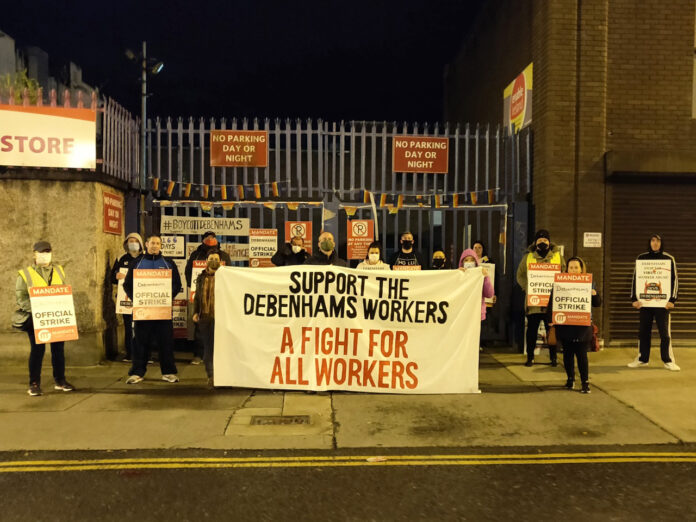
THE PLIGHT of Limerick’s former Debenhams workers has become the subject of a new documentary which premiered at the Dublin International Film Festival earlier this month.
406 Days tells the story of former workers of the Debenhams retail chain as they stood on the picket line after being told via email that the shop was shutting its doors and that their jobs were gone, without any redundancy money.
What followed was over a year of peaceful protests by former staff members who picketed outside stores 24 hours a day to prevent the company from removing stock that was left in the shops.
The documentary’s producer, Fergus Dowd, said the film came about because he wanted to help the former staff tell their stories.
“This generic email that they all got to say their jobs were gone arrived on the 9 April 2020.
“They weren’t getting redundancy. They were to contact social welfare or Citizens Advice,” he said.
Off the back of this, the 1,000 Irish Debenhams workers came together to stage the longest running industrial dispute in the country’s history, picketing outside stores nationwide – including at the O’Connell Street branch in Limerick – and calling for the company to give them four weeks redundancy pay in line with an agreement signed in 2016.
Among them was Mike McNamara from Patrickswell, one of the Limerick store’s longest serving staff members who had worked for the company, and their predecessor Roches Stores, for over 40 years.
Speaking to the Limerick Post, Mr McNamara said that the company showed no loyalty to their staff and left them in the dark about the future of their jobs.
“On Holy Thursday morning, around 10 o’clock, an email came in just saying that as and from that our jobs were gone. They were ceasing trading.
“It took us probably hours or days to realise what it meant. We were ringing each other after and we were all asking each other ‘What does it mean? Does it mean we’ve no more work, no more jobs?’
“You could imagine, Holy Thursday, Good Friday, Saturday, Easter Sunday, and probably a bank holiday on Monday. We were totally left in limbo,” he said.
The protests ran for 406 days, with former workers picketing 24 hours a day to stop the company removing stock from the stores – stock that the staff said should be used to pay redundancy costs.
Mike said: “We were determined. The only thing that came to light was that the stock that was in the stores was the only thing that was there that we could say was worth X amount of million, we knew it was worth fairly substantial money.”
“We tried to hold that stock and say that we, if it were sold off, would be the beneficiaries of that stock.”
Of the 11 Debenhams stores in Ireland, only two succeeded in blocking stock from being removed, Limerick and Cork.
Mike said that while the experience of protesting was difficult, the support from members of the public helped to spur them on.
“It was difficult, but we got so much support and so much backing from the public. It kept us going. We felt we had to do this, because we had to highlight this … and bring it to the people’s attention.”
Producer Fergus Dowd said that the film really shows the determination and resilience of the people on the picket line, particularly outside the Limerick store.
“There’s a piece in the film where the group are singing ‘Limerick, You’re a Lady’ and the film shows the truck reversing out and there’s guards, there’s helicopters in the air, the riot squad is there, and there’s people just on the street and they’re singing. It’s unbelievable.”
The film was premiered at the Dublin International Film Festival on March 4, and won the Irish Council for Civil Liberties (ICCL) Human Rights Film Award.
The ICCL jury said that “406 Days is an incredible testimony to the strength and resilience of a group of mostly female workers in the face of the might of an international company”.
“The women in this film could be our mums, our aunties, our grannies, our sisters … Their voices are so rarely heard in our society and our media. This film gives them and their voices a platform and for that the filmmakers deserve congratulation and celebration.”
Despite over a year of protesting, the staff never got money from Debenhams, instead the bill for their redundancy was footed by the taxpayer.
As a result of the Debenhams protests, a bill was brought before the Dáil called the Debenhams Bill to ensure that if companies go into liquidation, redundancy costs should be factored into company debts and paid by the company, not the public purse.
Mike said that pushing this legislation forward has given him a focus after he lost his job and urged government parties to pass the bill when it goes through the Dáil for a second time – having being voted down the first time.
“I would hope and I would ask and I would appeal with the main government parties and all the TDs within those parties – and we’ve a lot of local TDs within the government parties – I would ask them urgently to support that bill and to put it through.
“It’s not going to mean anything for me or for the Debenhams workers, but as far as workers go … it’s simple and all it’s asking is that the workers will be brought up in line with creditors, and with the liquidators, and they’d be guaranteed whatever their entitlements are.”


